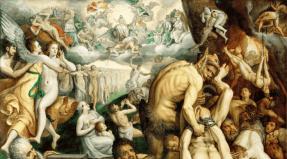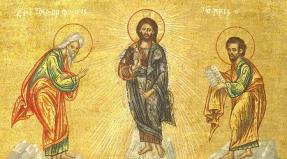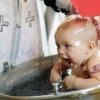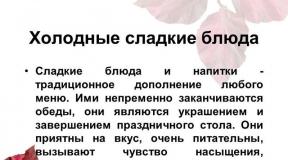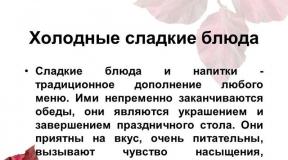Is it possible to give communion to unbaptized children. Which part of the service should you bring your children to? Do I need to commune a child
Some parents believe that babies have no concept of sin, and what is the point of giving communion to an infant who has no sins? However, Saint Theophan the Recluse said that the sacrament effectively and vividly unites the infant with the Lord, as a new member of His Church. According to the teaching of the saint, Communion sanctifies him, pacifies and protects him from the dark forces by God's grace.
Every person, even an irresponsible nursing infant, is open to receiving God's grace, which is perceived not by consciousness, but by the soul. In addition, there is evidence that children who receive communion often get sick less, sleep better, and do not be capricious. But not everyone knows the rules for communion with children. We will try to answer the most popular questions.
Which part of the service should you bring your children to?
Up to a year
With a baby, you can come to the reception of the Sacrament after the Liturgy. In this case, babies can be fed before communion. Only this should be done at least half an hour before communion, so that the baby does not accidentally vomit. Mothers who were preparing for the sacrament are allowed to partake of the Holy Sacraments with their children, even if they came with them towards the end or the middle of the Liturgy.
Up to seven years
From the age of two or three, it is necessary to gradually teach the child to be at the service, at least from the prayer preceding the end of the Liturgy, that is, from the general church singing of Our Father.
After 3 years of age, you can try not to feed the child, but there are no strict rules about this. Some feed children up to 6-7 years of age before service. Every parent should be smart about this. It is good to consult a priest about this. From the age of seven, it is customary to teach children to fast, but not strictly and gradually. For example, you can persuade him for Christ's sake to give up watching cartoons, or eating some food that is especially tasty for him.
Up to ten years
Children from 7 to 10 years old should be brought to church to sing "Izhe Cherubim".
It must be remembered that not every child, let alone a small child, can withstand the entire service, and therefore parents can come to church later. With children over 10 years old, you should come to the full service, but if the parents notice that the child is tired, they can go out with him, take a walk near the church. You should know that not all children have the patience to endure the entire service, so do not force him to do this, as you can make him dislike the service.
What prayers to read to children before Communion
Priests recommend that parents read at least one prayer aloud to their children or several prayers in preparation for the sacrament. Moms (unlike dads) do not need to read all the canons and all the rules. It is enough to read the prayer rule for Holy Communion. At the same time, either dad, or godparents, or grandmother, grandfather can read the canons and the rule completely for the child.
If, except for the mother, no one can do this, then she should pray according to her capabilities. But even if mom has absolutely no time for a large number of prayers, then it is enough to pray according to the saint's rule:
"Our Father - 3 times", "Theotokos Virgin rejoice - 3 times", "I believe - 1 time"
There is no need to fast for a child. However, before the Communion of the child, parents should refrain from marital relations. We must try to do everything possible so that coming to church for the introduction of a child to grace is not useless. But we must do everything to the best of our ability, because God knows our strength, He does not expect anything impossible from us.

It must be remembered that it is not enough just to bring a child to church and give him the Holy Communion. Parents should strive to preserve the grace received in the temple. On the day of communion, be at peace, not get irritated, and even more so and not quarrel. On the contrary, try to show special love for each other. Children are sensitive, and they will definitely understand that the day of the Sacrament is a special day. Only by their example, by their kind-hearted attitude towards each other and towards their children, parents will be able to instill in their children a reverent religious feeling.
How to teach children to pray
The child should be taught to pray in his own words. For example, "Lord save me, dad and mom, my godparents (names), grandparents (names)"... As you grow (from three to four years old), you can already teach the child the main prayer "Our Father..."... In this case, the child should explain each word so that he specifically understands the meaning of the prayer.
Gradually (from four to five years), the child can be given a short rule of several prayers. "Our Father ...", "Virgin Mary, rejoice ...", "Sweet angel of God, pray to God for me", "Lord save and have mercy on me, dad and mom, my godparents, grandmother and grandfather"... The rule for a child should not be difficult, and short (from 5 to 10 minutes in the morning and in the evening). The main thing is that he understands what to pray for and pray willingly.
How to prepare for confession
Children have different ideas about sin than adults. Therefore, the Church, as a rule, does not confess children under the age of 7. Children under this age are not confessed because, although children can tell about their sins, they cannot bring repentance in order to completely correct themselves.
Parents of children from 7 years old should find time for a little preparation for their first confession. If a child has committed an unseemly act, the parents should explain to him why he did wrong and ask him to ask for forgiveness, first from God, and then from them. This is how the first skills of confession are instilled. Over time, parents need to conduct simple conversations with their child about confession, about the meaning of the Sacrament of Communion. To speak in accessible words about a God who loves everyone. All deeds, all deeds of people, including children, all their thoughts God sees. And if a child has done something bad, then he expects when he himself confesses this to his parents and in confession will tell the priest through whom God will forgive him bad deeds, that is, sins.
How often can children receive Holy Communion?
When asked how many times children can receive communion, probably every priest will answer: "As often as possible." But there are also certain, recommended periods of time. Infants can receive communion almost every day, and children from a year and more 2-3 times a week. Children over the age of seven, once a week or once every two weeks and on holidays. Note that these are just guidelines. It happens that, due to employment, parents give communion to their children less often, so they must determine this in accordance with their capabilities.
But children's preparation for communion is special, individual
As you know, you need to prepare for Communion and Confession, but children's preparation and children's confession are very special, not comparable to an adult. The task of a Christian, including a young one, is to benefit from the Confession and the Sacrament, therefore it is important that the preparation for the sacrament and the confession itself are effective and not overwhelmed. If the priest is experienced, this issue can be discussed individually, if the priest requires reading all the canons, strict fasting for the child, then the big question is whether this is useful ... At this stage, in my opinion, an individual approach is important if a child is from infancy to The temple is one thing, if from time to time it is another.
You need to talk and explain with the child, and not command and drag by force
It is important in advance, even before preparation, to explain to the child in simple language why now he needs to prepare for the sacrament. And in fact, every parent should have a timely conversation with his child that at the age of 7 his childhood ended, that adult life began and all the sins and bad deeds of God and his Angels are taken into account and recorded on him. And in order to be cleansed from sins, he must independently confess and receive communion. What is supposed to repent in Confession, the child also needs and can be explained in advance, because you know all the bad deeds and inclinations of your child very well. It is not necessary for the parents themselves to write a note to the child or force them to stand above their souls until he writes this note. Leave the child his individual Confession and do not ask according to Confession, about anything he confessed, or what the priest asked. If the child wants, he will tell him himself, if not, then no.
Alternatively, the preparation can be as follows, but it is important to discuss individually with the parish priest
On all issues related to fasting, I note that, in my opinion, it would be correct to give up sweets for the first two days, give up meat on the second day, but leave the opportunity to eat fish and dairy products, and on the third day give up fish and dairy products. If the child is still small, then the third day we refuse fish, and we leave dairy in the diet. By and large, this is all individually and is discussed with a specific confessor. Therefore, my reasoning in this case is more reasoning than a recipe.
The spiritual preparation of a child is also important.
It is important, in addition to physically preparing the child for the sacrament, spiritually, reading prayers more often, reading the children's Bible, watching less cartoons, and for example, replacing them with viewing the Law of God, it is in our gallery.
Everything gradually, and prayers too
For all the points that relate to prayer preparation, I emphasize: the child needs to be taught to evening services, but if it is still difficult, you can first skip, then come halfway, then stand completely. On the evening before Communion, just like adults, children do not need to watch cartoons, but they need to read books about God and his Saints.
Then came the time for the question of prayers. I am convinced that it is necessary to introduce a child into prayer gradually. At first, as I think, it is permissible to read three prayers from the evening prayers, then after the "Canon to the Guardian Angel" read one prayer, after the "Canon to the Theotokos" read one prayer, after the "Canon to the Savior" read 1 prayer and then read 4 prayers from the "Canon to Holy Communion ”. I think this will be enough, but it is important to read them clearly, with attention, praying from the heart, but not developing a formal attitude to prayer. Gradually, the number of prayers should be increased. publishing house of the Moscow Patriarchate, everything there is prepared for children's prayer.
This material is collected from the Patristic literature, which is freely available on the Internet, both separately (in fragments) and in whole e-books, the volumes of which are very large for the modern reader, who is accustomed, as a rule, to catch only the superficial essence. The author of this project has systematized and selected the material as much as possible, highlighting the most important thing, focusing on his point of view.
The creator of this project does not claim to be the authorship of the presented materials and strongly recommends interested readers to purchase in printed form the full versions of the Patristic works. The sources used are indicated in a special section of our website "Recommended literature and sources", in addition, we have accompanied each book with a small review, useful for all caring readers.
"Should a child fast before the sacrament?"
- Again: if fasting is a burden for parents, then there is a problem with the child. And if this is the natural life of a family, then such questions do not even arise. The child eats what the adults give him. Fasting is not a hunger strike. This is a change in their habits, lifestyle. The main thing in our life is not the number of prayers, not fasting - all this is just a means.
It is necessary not to prohibit, not to force, but for the child to voluntarily accept such a way of life. If he was forced, he would break free from under the parental wing and still do it his own way, that's what is awful. The Holy Fathers advise the child to raise the child so that when he grows up, when at the age of 7 he goes to confession for the first time, he himself felt like a Christian, so that he would take the yoke of Christ voluntarily.
It is impossible to force to do this. The beauty of such a life can only be shown. And when children get carried away with the spiritual life, they discover such riches that cannot be compared with all the riches of the world. As in the Gospel: I found a pearl, went and sold everything for it. So is the spiritual life: if you find it, you will give up everything in order to live this life. It is necessary to help the child discover this wealth within himself, so that he does not think that this is all only external.
"If a child still takes communion without confession, should he already somehow prepare for the sacrament?"
- There are no special rules, but if it is possible that he does not partake before the sacrament, it will be good. It is necessary to teach the child so that from an early age he prepares for a trip to the temple, gets ready.
"When a child prepares for his first confession, you need to tell what sins he has, how to repent of them?"
- We are used to drawing the attention of children to what they are doing badly. But the main problem is not that they do bad things, but that they do not try to do good things. The biggest sin is that a person does not do what he ought to do. They scold him, and the man realized that he was bad. But the sin is that he does not become good. The main sinfulness is inconsistency with the ideal, holiness.
What is repentance? This is a change in life towards the ideal, holiness. I have to correct myself. If I only have a vision of deviation, and not a movement towards the ideal, this is the worst thing. One must see the goal of the Christian life - pleasing God. What did I displease God, should I please, and not please? I didn’t do it, I didn’t do it ... Our very sins are not in doing, but in not doing. Did not fulfill his duties as a child. Which? Obedience to parents, help, humility, their duties as a student ... When an adult comes and says that he has no special sins, then this is evidence of a lack of understanding of the purpose of his life.
"Do the parents have to somehow guide, suggest, or does the child decide for himself what to say to the priest?"
- Even before the age of seven, he must be prepared so that the day will come when he will come to confession for the first time. This is a holiday! This is the first meeting of a child with a priest in confession. Parents pass the child from their hands to him. The priest must also be prepared for this. Godly parents warn me in advance.
I already know that the child has come for the first time and we need to talk to him. Here is another conversation - the conversation of the confessor, spiritual nourishment of the child begins. Not just formally, the parents bring the child to church, but it is necessary to bring the child to the priest who will take care of him later.
"Can I ask the child what the father said to him?"
- The secret of confession lies not only in the fact that the priest cannot tell about what he heard in confession, but the one who confessed must also keep it. Idle curiosity about the secret of spiritual life is sinful. Therefore, parents should teach themselves to humble themselves, not to ask such questions.
"And if the child wants to tell himself, because he is used to sharing everything with his parents?"
- Then be silent and listen. Then consult with the priest. But do not stir up this conversation, do not encourage. All the same, the conversation on confessional topics should be only in confession. And the child must also be able to keep his inner peace.
"Parents can tell the priest: the child, they say, does not do something or something else?"
- You can consult on issues that confuse parents.
Instructions
You can take communion with a child in any church when the liturgy is taking place. Most of the parishioners receive communion on Sundays or in large Orthodox. For the Sacrament, you can choose which one appeals to you. However, it is better to commune in a church located not far from home, since on a long journey the baby can get hungry, become capricious, require a diaper change - and it is not very convenient to solve such problems on the way.
On the eve, one should read the canons with "Follow-up to Holy Communion" and pray.
Withstand fasting from baby not required. If a child asks for food in the morning before, be sure to feed him, well-fed babies are less capricious. You will hardly be able to withstand the entire morning service in your arms, and it is not necessary. Better come to the beginning of the Sacrament, knowing in advance the approximate time. If the child is complacent, you can stay with him in the church while the service is going on. In the case of a baby, it is better to go out and wait for Communion on the street.
Communicating baby for the first time, many mothers worry about his fragile stomach. After all, the participants will taste a piece of prosphora and a little Cahors. Do not worry! Infants are given communion with a drop of diluted wine without prosphora, so that Communion in no way can cause colic.
Traditionally, they receive communion first, then older, then, after them. If the parents also prepared for Communion (fasted, confessed, read the canons with prayers for Holy Communion), they can commune with the baby. At the time of communion, it is imperative to mention the name given at Baptism.
Useful advice
Infants should be given Communion as often as possible, such as every Sunday. In the absence of such an opportunity at least once every one or two months.
Sources:
- communion of infants
The fulfillment of the Sacrament of Communion in the church tradition has existed since the time of the Last Supper. On that day, Jesus distributed the broken bread to his disciples, explaining it this way: "This is my body ..." Since then, the sacrament has become a deep spiritual need for every Christian. It is known that it is inadmissible to receive communion in a formal manner. Preparing for communion therefore it must become a serious inner work of man.
Instructions
Avoid giving your child water or drink in the morning. Before going to church, make sure your child has not forgotten how to be baptized. After confession, the priest will cover his head with an epitrachil and read a special prayer of permission. After that, the child will have to cross himself, kiss and the Gospel, and then ask permission to.
After receiving communion, stay with the child in the church and pray until the end of the service. It is better for you and your child to spend the rest of the day calmly, avoiding talking, TV and unnecessary fun, in order to preserve the purity of the soul purified from sins for as long as possible.
Adults and children over seven years of age must confess before communion. Usually starts before. On the morning of the sacrament, come to the temple before the start of the service. Communion itself takes place after. If you confessed, repented of your sins, and they were forgiven you, you were admitted to the sacrament.
Come to the pulpit - this is an elevated place in front of the iconostasis. There is a priest on it with a tray and a Cup. Let the children and men go ahead, who should be the first to receive communion. Cross your arms across your chest and clearly state your Christian name. Reverently drink wine from the Chalice (the Blood of Christ) and take the soaked bread (the Body of Christ), immediately swallowing it. Kiss the lower part of the Chalice, go to the table where the clergy distribute small prosphora and wine diluted with hot water ("warmth") to all those who received the Holy Communion.
At the end of the Divine Liturgy, the priest will bring out a cross, to which you should touch with your forehead and lips. Now you can leave the church.
After the sacrament on this day, if possible, do not engage in everyday conversations, do not engage in everyday affairs and work, devote the day of the sacrament only to godly deeds, viewing spiritual ones, reading spiritual books, helping loved ones, works of mercy.
a secret with a particle of Body and Blood. After, as they wipe their lips with a handkerchief, kiss the Cup and go to the table, where they take a drink and eat a particle of prosphora in the mouth. Without taking a drink, you can not apply to icons, the Gospel or the Cross. After that, the parishioners pray until the end of the Lord's service, then disperse, trying to preserve the purity of their souls as long as possible. It is advisable to communicate a little on this day, give up TV, marital intimacy and refrain from bad habits. They receive communion only once a day, sick and weak people invite a priest to their home, children do not receive communion at home.According to the Orthodox doctrine, the sacrament of communion consists in the eating by believers under the guise of bread and wine of the real essence of the Body and Blood of the Lord Jesus Christ. The sacrament of communion is one of the seven Orthodox sacraments in which a person is united with God.

The establishment of the sacrament of communion does not apply to human ordinance or the invention of the clergy. If we turn to the gospel narrative, it will be clear that the sacrament of the Eucharist (communion) was established by the Lord Jesus Christ Himself.
The sacrament of the sacrament was established by the Savior shortly before the death of the cross - on Thursday. Until now, this day is called "Maundy Thursday" as a sign that this is a special time for the purification of the human soul and the union of the latter with God. As the Gospels narrate, during the sacramental supper in the upper room of Zion, Christ took bread, broke it and distributed it to his disciples to the apostles with the words that this is the true Body of the Son of God. Further, the Savior blessed the cup of wine, saying that it was His Blood. The Lord Himself commanded to perform this sacrament in remembrance of Him.
The sacrament of the sacrament took place already in the first centuries of Christianity. So from the history of the Church it is known that believers gathered in secret from the pagan authorities, performed divine services and took communion of the Body and Blood of Christ, fulfilling the covenant of the Savior.
The need for the sacrament of the sacrament is also stipulated in the Gospel. Christ Himself said that communion is necessary in order to have life in oneself. The Gospel speaks of union with God in the sacrament of the sacrament. Christ preached the gospel that those people who receive communion abide in Him (the Lord Jesus Christ) and the Lord Himself abides in them.
If your family is Orthodox, it is very important to convey to the children the meaning of the great Sacrament of Communion. Their souls are not yet so thirsty for the Sacrament, because peace and life for them is a fairy tale and a miracle. The hard work and patience of parents will help children find eternal joy in communion with God.

The Lord gave our child to be born so that we would show him the way to salvation, which lies through the Sacrament of Communion. How to tell him about the Holy Mysteries?
The believer who wants to receive communion, the night before, after the service, it is necessary to bring repentance for his sins before the priest, without hiding them, to be sincere with him. If one does not confess, no one can be admitted to Holy Communion. Children under 7 years old are allowed to take communion without repentance, not because they are sinless, although they are small, they may have sins. They just cannot yet openly open their souls, realize their sins.
In order for a child to realize the full importance of the Sacrament of Communion, he needs to know the story of Jesus, the Savior of the world. That the Lord, who once ascended into heaven, is with us, and will remain with us, all the days until the end of time. And in the beginning there was a blooming Garden of Eden, and Adam and Eve were happy there. They were joyful and full of love, God came to them. It is difficult to say how he came, but they knew that He was there, and it was good for them. And then, when the gates of Paradise closed after the Fall, they cried with tears of repentance and hope.
Centuries passed, people began to forget God. Then the Son of God was born on earth, his name was Jesus Christ. Jesus walked the roads of Palestine and told people that the Kingdom of Heaven had approached them, that it was here, very close. He who believes in Me has eternal life; I am the Bread of Life. Your ancestors ate manna and died, but whoever will eat the Bread that comes down from heaven will not die. But the bread that I will give My Body, I will give it for the life of the world.
A child in infancy is a very impressionable, kind kid. For him, striving for God as good is a natural state. If this desire is sustained, it will help him understand that God is omnipotent. God knows everything about you, sees every step you take, hears all your thoughts. If you believe and not grieve God with bad behavior, but please with good thoughts and deeds, the Lord will certainly help you. In order for the baby to feel the care of the Almighty always, an angel is sent to him, who accompanies him, all his life. In the future, faith will help the child become a Christian with strong convictions. And while he is still small, he will help not to sin, and to begin the sacrament of communion with reverence for salvation.
The other day they brought to communion the one who most often adds to the priest standing on the pulpit with the Chalice in his hands a fair amount of gray hair - a screaming baby.
This baby was one of those who can’t be called “babies”: about two years old strong butuz, which is sitting on the arms of the father, and even more so to lie with his head on his right hand in a position “like breastfeeding” flatly refused. He fiercely yelled "I won't!"
In the end, mom and dad, who confessed for the first time that day, received Communion themselves, but they did not dare to bring their child to the Chalice again. And I was, frankly speaking, happy about it - from the sight of a child who was tied up and who was forcibly shoved through clenched teeth with a liar with a drop of Christ's blood, not only does not a satisfied feeling of fulfilled duty arise, but it just happens to be very uncomfortable ...
There is such an attitude: “all the best is for children”. To give communion to the child, in whatever way you like to pour the coveted substance into him and to imagine in this the fulfillment of his Christian parental (grandmother's, receptive, etc.) duty - and then the grace of God herself will magically accomplish everything necessary and useful for the child ... than dubious, and the condescension of a wonderful "grace" on someone who is not at all ready for it brings to mind the plot about Danae and the golden rain that descends on her, neither in her sleep nor in spirit.
Yes, yes, we are talking here about the readiness of a person (even a very small one) to commune.
There is also such an opinion among the Orthodox rigorists: a child opposes the Holy Communion, which means that it is time for him to be lectured, not otherwise than possessed by demons! Not at all, it is wildness to consider an unintelligent child as a deliberate and ardent enemy of God. He's just not ready for the sacrament. And most often he is not ready precisely because his parents are not ready to meet Christ.
Here it is, the key word - "with Christ." The fact that the Chalice is not a magical remedy for illnesses and misfortunes has been talked about. But let us add something else important: in itself, bringing (and even approaching) the Chalice will also not automatically make a person a Christian, will not in itself introduce him into the circle of disciples who partake of Christ at the Last Supper. Because before lying down for this supper, the disciples met Christ, chose Him as the meaning of their life, loved Him and followed Him, lived inside, roughly speaking, a specific religious context with specific messianic aspirations associated with their Teacher.
 Simply put, the main preparation for the meeting and intercommunication of the infant with Christ in the sacrament of the sacrament is the Christianity of his parents. Their churching, their adherence to the commandments of the Gospel, their prayer and participation in the sacraments, the same regular communion, finally.
Simply put, the main preparation for the meeting and intercommunication of the infant with Christ in the sacrament of the sacrament is the Christianity of his parents. Their churching, their adherence to the commandments of the Gospel, their prayer and participation in the sacraments, the same regular communion, finally.
(By the way, I would like to note: yes, there are times when parents seem to be quite churched, but their child is still afraid or nervous when going to church. The human world is wide, it cannot be accommodated in one model, and everyone is the case, of course, must be considered individually in conversation with an experienced priest).
The infant receives the enlightening and transforming grace of Christ, primarily through his parents. This is the law established by God, and He does not break His laws. Of course, if the parents are completely unchristian (or they are not around), then God is able to arrange the ways of a person so that he can still come to His Kingdom, but this is still rather an exception, and God wants us to learn live according to the rules that are the laws of the Kingdom. According to the commandment, which the ancient psalmist saw as wide and green and was more than honey to his lips, but to us, alas, sometimes it is seen as unnecessary atavism and narrowness ...
All this I would like for not only unchurched parents of babies to hear, but also everyone who considers themselves the Church. All of us are those who, standing in the church at the liturgy, frown and shake their heads at the sight of a grown-up mother dragging a resisting child to the pulpit, who does not understand where and why he is being drawn, who only feels that it is by force, clearly does not believe the admonitions that “ Father will give a sweet berry "(and thank God that he does not believe).
You and I can do a lot - for example, pay attention to our unchurched relatives, loved ones, friends with small children, and help them figure out what is what in the faith of Christ, what is the communion of His Body and Blood and why it is. And also, which is also very important, once again ask ourselves the question: why do we go to communion ourselves and what exactly do we expect from this sacrament (for example, once again grieving in confession: “Oh, father, I’ll just talk earnestly, I will subtract the rule and take communion - right there the neighbor will bother with conversations, and at once I lose all grace! .. ").
(25 votes: 4.6 out of 5)priest Oleg Netsvetaev
Parents do not always understand that not to receive communion with their babies means without due attention to leaving the words of the Lord Jesus Christ, Who “... said: let the children in and do not prevent them from coming to Me, for such is the Kingdom of Heaven” ().
“Infancy,” says the well-known pastor of the Orthodox Church, Archimandrite, “is the most important of all ages in human life: in the first two years, a child receives as many impressions as in the rest of his life. Therefore, commune the children as often as possible. "
We will try to clarify the direct vital necessity of the intercourse of the infant with God through Holy Communion and the whole danger of leaving the infant without Communion, and therefore outside of direct communion with Christ.
I.
Several years ago I visited a small Lithuanian town on the border with Poland. The town is like a town ... However, that's what struck me there and remained in my memory, I think, for the rest of my life. It was a summer Sunday morning, and I went to the local Orthodox church to pray. The church was small, wooden, very beautiful on the outside and splendid on the inside. And not far away was a Catholic church, a huge red brick building, a local architectural landmark. From the Catholic church the measured call of the church bell was heard.
I was struck by the abundance of people on the streets of the quiet town in the early hours of Sunday morning. Lithuanians, residents of this place, and visiting Poles went to the Catholic Church. They walked smart, festive, they walked with families, adults held the hands of children. The kids also walked smartly, dressed like an adult, joyful. From all sides people flocked to the temple to meet with the Lord. Let's make a reservation right away, it was not some kind of Catholic holiday, but just Sunday. I continued on my way to ours. There were few parishioners inside, which is understandable - Lithuania after all. But with the exception of the son of the priest-abbot, who served him in the altar, not a single child was in the temple. Earlier, the attention was drawn to the small number of children in our churches. But then the contrast involuntarily drew attention to itself: people went to one church in families, to another - one by one, on the way to one church there were many children, in another - not a single one. Needless to say, it was then that the question arose: why is this? The question is relevant to this day. The answer to it is, in general, clear. But why does little change in our Orthodox life? Why, having baptized their children, do people not regularly bring them to churches for communion? “Some parents, especially young ones, look at a child for a long time as a toy or a doll,” writes Bishop Innokenty of Yekaterinburg and Irbit. - They feed him, put him to sleep, caress, play and play naughty with him, protect him in every possible way from colds, etc., and otherwise allow him to run, walk and do whatever he wants, unless they bother them with their crying and roaring. And for a long time they do not notice that their beloved "angel" is in essence a stubborn, capricious, wayward, unbridled, disobedient, greedy, greedy, evil child. "
How often one hears: "We were not taught this, we do not know this, we do not understand this, we were brought up this way, life is so difficult," and so on. etc. There are many reasons for self-justification, and our task is not to reproach readers, but to help them understand, in particular, the need and importance of communion of the Holy Mysteries of Christ, especially for children.
If you ask any Orthodox believer directly whether you need to bring your children to church and partake them of the Mysteries of Christ, then, of course, everyone will answer the same: “Yes, it is necessary”. If you ask further how often you need to give them Communion, then again the majority will answer correctly: "You need to take Communion more often." Why does everything go wrong in real life? Here, it seems to us, there are a number of reasons, but we dare to assert that the main one, from which all the others follow, is the lack of faith in us. And if this is so, then how can we manage to bring up children in piety, in love for God and His Church? The Holy Passion-Bearer Empress Alexandra Feodorovna says: “Parents should be what they want their children to be - not in words, but in deeds. They should teach their children by the example of their life. "
Very often people who call themselves believers understand the Orthodox faith in a simplified way. Many people understand faith as a simple acknowledgment of the existence of God. However, this is clearly not enough to be Orthodox. The existence of God is recognized by the overwhelming majority of the inhabitants of the Earth and not only by them: “You believe that God is one: you do well; and demons believe and tremble "(). Very often I had to answer the question "Are you Orthodox?" hear: "Yes, I am baptized." People do not even pay attention and do not think about how the question is posed. And from the confusion of the concepts "to be baptized into the Orthodox faith" and "to be Orthodox", many, calling themselves Orthodox, limit themselves to visiting churches on major holidays, are content in their spiritual practice with a common confession, consider it sufficient in passing to go to the temple to light a candle and something to ask the Lord, and then again plunge headlong into the affairs of everyday life. Naturally, such people do not receive communion with their children and cannot, as their children grow, educate them in the Orthodox faith. Lack of their own faith prevents them from doing this. But this should not be so and you cannot put up with it! After all, in the Church we are not just “present” - we actually participate in divine services, that is, ourselves, led by a priest, we serve God, we communicate with Him.
Lack of faith makes us spiritually weak. And it is this spiritual weakness that does not allow us to see ourselves as we really are. We call ourselves believers, and when we say this, there is no guile in us. We truly believe what the Creed says. In this we are honest with God and people. But, unfortunately, very often our faith remains declarative. Our way of life, behavior, affection, and much more that accompanies us in this life, testifies to how far we are from the Orthodox faith. But “the child should recognize Christ not from the picture book, but from the mood, from the way of thinking, from the way of life, from the mutual relations of family members. If he recognizes Christ in this way, Christ will become close and dear to his soul for life. "
Faith is the main Christian virtue! Without faith, we will have no hope of salvation, and there will be no Christ's love in us. Therefore, we must often reflect on what our Orthodox faith is. Not content with believing in God. Let us repeat: the majority of people on earth believe that there is a Higher Creative Principle. Only atheists reject Him, but there are not so many of them in the world. Do not be exalted by the fact that, they say, how smart we are, have comprehended what God is. Faith in the Lord is a gift from God: "For by grace you are saved through faith, and this is not from you, it is God's gift" (). Not forgetting to thank the Lord for this is our Christian duty, a manifestation of our faith. And our duty is to cultivate this faith in children, so that it will enter them, as they say, with mother's milk.
Our deeds should testify to our faith: “But do you want to know, you foolish person, that faith without works is dead? Was not our father Abraham justified by works, when he laid his son Isaac on the altar? Do you see that faith contributed to his works, and by works the faith was perfected? And the word of Scripture was fulfilled: “Abraham believed God, and it was imputed to him for righteousness, and he was called a friend of God. Do you see that a person is justified by works, and not by faith only? " (). The act of faith accomplished by Abraham was not that the patriarch recognized the existence of God - he did not doubt this before, but that he trusted God, completely surrendered himself to His will. Trust in God, His commands and promises, and a person should be guided in his daily life. "Zeal (in the Lord, for salvation) is a matter of grace and a testimony that this grace is persistent in you and produces a grace-filled life ... As long as there is zeal, the grace of the Holy Spirit is also inherent ..." (St.). Otherwise, religious education will be limited to unconvincing and boring moral teachings.
II.
The enemy of the human race "does not sleep" and in every possible way tries to confuse us and lead us away from the path of salvation. Realizing this, all the more we must seek help from the Lord, the Mother of God and the holy saints: "Without Me you cannot do anything else" (). We need to strengthen our faith. People do not ask why the Apostles, daily communicating with the Lord, directly learning from Him, witnessing His many miracles, nevertheless asked the Lord: "Increase faith in us" (). “The waves of our faith are only a surf and a retreat to our spirit of the boundless sea of divine life. And he is in the hands of God; his movements and strength obey the beating of the Lord. He quickens its pace, increases its height and proportions its strength "(Bishop. The Gospel constantly draws attention to the importance of faith, gives wonderful inspiring examples of faith, the faith to which we must strive," Truly I tell you: if you will, have faith the size of a mustard seed and say to this mountain: "go from here to there," and it will pass; and nothing will be impossible for you "(),
“This is the will of Him who sent Me, that everyone who sees the Son and believes in Him may have eternal life; and I will raise him up at the last day ”(). We must make sure that our children can see the Son of God with the eyes of faith and believe in Him. The seeds of faith are sown in us by the Lord Himself. Our task, as God's co-workers, is to grow these seeds, to prevent them from withering away and perishing. We must strengthen our faith following the example of the Apostles with the help of God. In the relationship between man and the Lord, initially lies the Creator's love for his creation: “God is love” (). And one of the properties of God is His immutability. Therefore, the Lord's love for man is original and unchanging. “Jesus Christ is the same yesterday, today, and forever” (Heb. 13: 8). A person, realizing the existence of God, but being at the lower stages of his spiritual development, can show trust in the Lord, the desire to obey the will of God, out of fear of punishment from the Almighty for his sins (disobedience to the will of God) or out of the desire to receive a "reward" (well-being personal and their loved ones, material goods, etc.) However, as spiritual growth progresses, fear and selfish calculation is supplanted by the love of the creature for its Creator. And love is always fruitful, especially when it is mutual. Any spiritual quality of a person is manifested in his actions. A kind person does good deeds, some scoundrel does dirty tricks. The criterion for evaluating our faith and love is our deeds, words, thoughts: “If you love Me, keep My commandments” (); “He who loves Me will keep My word” (; 3). The Apostle teaches us the same: “What is the use, my brethren, if someone says that he has faith but does not have works? Can this faith save him? If a brother or sister is naked and has no daily food, and one of you tells them: “go in peace, warm yourself and eat,” but does not give them what they need for the body: what is the use? Likewise, faith, if it has no works, is dead in itself ”().
And so, if we say that we love our children, and we really love them, then the kindest deed, the highest manifestation of this love will be our striving to attach a child to God, to unite with Him, to open our child to Divine love. Our love for children, like our whole lives, should bear witness to our faith. If we believe, then we love God; if we love Him, we do His will. Whoever believes the Lord believes the word of God; whoever loves Him, he loves what He left us for our good, moreover, for our salvation, namely: the Church, in which the Holy Spirit invariably dwells from the time of Pentecost, the disciples and the apostles, and through the continuous apostolic succession - church hierarchy (bishops and priests), Church Sacraments. Unfortunately, many, not having strong faith, neglect this wealth and do not ask the Lord to increase faith in themselves. In such people, the seeds of faith sown by the Lord do not germinate and are not even felt by many people. Bringing their child to an Orthodox church to baptize, many explain their act by the pious tradition of the Russian people. Such people, living somewhere in Western Europe, may just as well come to a Catholic church or to a Protestant church. And living in America, in general, they could get lost among many different sects. It is not surprising that with such a faith, many, having baptized the baby, do not subsequently bring him to church and do not partake of the Holy Mysteries of Christ. “The modern world, modern life very harshly question faith. It seems to me that only genuine, true faith can withstand this test, but any surrogates of faith, all superficial approaches to faith - thank God! - are crushed and destroyed "().
Lack of faith, false faith leads to a lack of love for God in people. A loving person always strives for constant communication with the object of his love and is painfully experiencing separation from him. So, a young man in love does not want to part with his beloved; a loving child cannot imagine his life without dad and mom; a person who is in love with any business cannot imagine his life without him. This should be the case in relation to a person with God, but this does not happen.
People “perfectly” manage without their Heavenly Father and remember the Lord when something has happened in their lives. And this indifference, lukewarmness, immersion in earthly affairs, everyday concerns, of course, is reflected in children. But “for a Christian mother it should be a joy to teach her child, even then, when his voice is still weak, and his tongue is still babbling, pronouncing the sweetest name of Jesus,” says the saint.
It may be objected that the state of a person, when he constantly thinks about God, yearns for Him, longs for a meeting with Him, is impossible in modern life, and if possible, then it is more suitable for monastics or the elderly. The example of the holy saints testifies to the opposite. In order to better accept this state and the possibility of it in our daily life, I will cite the image that Metropolitan Nikolai (Yarushevich) gave in one of his sermons: “Imagine a young mother who is busy with some kind of work, work, service; she puts her soul into this work, into this service. She gives herself to her entirely, without any flaw. But at home she has a little child, a baby, and in the midst of her work, the thought of what the child is doing now does not leave her: maybe it is crying, maybe it is asking for food, and there is no one to give it to it, maybe it fell out of the cradle ...
And who can say that these thoughts of a mother about a child left behind in the house are illegal, unnatural and undermine the quality of her work, if this mother does all her work from the first hour to the last as she should because of her duty.
This is just a faint semblance of how we, who are busy with our earthly labor, giving everything that we must give to labor according to our earthly purpose, will never stop thinking that we have an immortal soul that we must water, feed, which we must protect from dirt. to be adorned with heavenly beauty. And this in no way and never prevents believers from being honest performers of their earthly duties. " his created nature, his place in this world and his true purpose, performs specific actions, evaluating them not from the point of view of vain expediency, but according to whether they are pleasing to the Lord or come into conflict with the all-good will of God.
Such a perception of the world does not arise by itself, it must be formed in a person at the stage of infancy. Then his soul will develop, and he will all be drawn to the True Light. We will cite here the words of the archimandrite, which may seem “bitter”, but they are true: “What does the feast of the Nativity of the Most Holy Theotokos teach us? So that Christian parents remember to whom they dedicate their children, to whom they give their souls - to God or to a demon.
The child already in the womb feels and perceives everything that happens around him. Especially the state of mind of the mother, with whom he is connected, as it were, by thousands of threads. If parents live in a Christian way, pray, confess their sins, take communion, then by this they bring their unborn child to God. If, instead of prayer, abuse and curses are heard in the family, if wild quarrels occur between the parents, the child is, as it were, handed over to the demon, for his soul receives a lesson in cruelty.
It has been proven that when a person becomes furious, poison appears in his blood, and during quarrels and outbursts of hatred in the family, the child is poisoned with poison in the literal and figurative sense of the word. His psyche is deformed and destroyed. A child perceives everything good and evil much more directly and deeper than adults, his subconscious keeps everything until his death. Many parents do not find an answer, complaining about the cruelty and depravity of their children, reproaching them for the blackest ingratitude; ask who taught them this. And the answer is: the parents themselves taught, without realizing it ... Nothing is so close to each other as the souls of parents and children. Therefore, in order to bring a child to God, parents must devote their hearts to God. "
III.
Metropolitan Nicholas in the above passage from the sermon speaks of the soul. People have a poor idea of what the soul is, and therefore do not think about it, do not care about it. But the baby is already endowed with the greatest, the whole world surpassing value - the human soul. The Gospel testifies to this: "... the baby leaped with joy in my womb" (). The saint discusses this in the following way: “When does the soul unite with the body? - At the moment of conception. - When did the Savior become incarnate? - Immediately, as the Ever-Virgin said: behold the Servant of the Lord ... The Holy Spirit found, and the Son of God took flesh, or human nature.! in the bud ... "
Of all the above, St. righteous John of Kronstadt, the only spiritual blessings available to a baptized infant is the communion of the Holy Mysteries. But this is the true spiritual food, which in its entirety brings God to Christ! “He who eats my flesh and drinks my blood abides in me, and I in him. As the living Father sent Me, and I live by the Father, so he who eats Me will live by Me ”(). “The flesh and blood of the Lord Jesus Christ, acceptable in the Sacrament of the Eucharist, nourish, strengthen and give life to our spirit” (Archbishop Demetrius of Kherson).
Archimandrite Raphael, in his Sermons and Conversations, notes: “Those who say that children should not be given Communion are the same as saying that there is no need to take care of a young, weak plant just at the time when it is necessary to protect it from thickets of weeds and weeds. I would say that infancy is the most important of all ages in human life: in the first two years, a child receives as many impressions as in the rest of his life. Therefore, commune the children as often as possible. "
If young parents understood that there is true faith, true union with God, then they would understand that their child is a gift from God, a creation of God, and not just the result of combining the physiological properties of dad and mom. “Your (God. - Comp.) Hands worked over me and formed all of me around - and You are ruining me? Remember that You, like clay, fashioned me, and you turn me to dust? Did you not pour me out like milk, and thicken me like cottage cheese, clothed me with skin and flesh, fastened me with bones and sinews, bestowed life and mercy on me, and Thy care kept my spirit? " ().
The religious worldview makes it possible to understand that the fate of their baby mainly depends not on the will of a person. Parents are co-workers with the Lord in the formation of a new person as a person. And it is living faith that allows parents to understand and accept the domination of their child's soul over his body. “What good is it to a person if he gains the whole world, but damages his soul? or what ransom will a man give for his soul? " (). Let us also cite the words of the Holy Passion-bearer Empress Alexandra Feodorovna, who also tells us about the mutually sanctifying connection between us and the children: “There is nothing stronger than the feeling that comes to us when we hold children in our arms. Their helplessness touches noble strings in our hearts. For us, their innocence is a cleansing power. When a newborn is in the house, it is as if the marriage is born again. The child brings the couple closer together like never before. The previously silent strings come to life in the hearts. Young parents face new goals and new desires. Life immediately takes on a new and deeper meaning.
A holy burden has been laid on their hands, an immortal life that they need to preserve, and this instills in parents a sense of responsibility, makes them think. “I” is no longer the center of the universe. They have a new goal to live for, a goal big enough to fill their entire life ..?
Of course, with children we have a lot of worries and troubles, and therefore there are people who look at the appearance of children as a misfortune. But only cold egoists look at children this way ...
It is a great thing to take responsibility for these young lives, which can enrich the world with beauty, joy, strength, but who can just as easily perish; it's a great thing to nurture them, to shape their character - that's what you need to think about when you set up your home. This should be a house in which children will grow up for a true and noble life, for God. "
Such parents, taking care of their child, will concentrate their efforts primarily on the formation of a healthy and strong soul. However, such parents will also have sufficient care for the flesh, for the body is the receptacle of the soul. Moreover, the human body is meant to be a temple. “Do you not know that your bodies are the temple of the Holy Spirit living in you, whom you have from God, and you are not your own? For you have been bought at a price. Therefore, glorify God both in your bodies and in your souls, which are God ”().
But if the baby's parents do not think about all this, then they will not take care of nourishing his soul, although, perhaps, they will come to church, and order prayers, and donate candles for the health of their child. It is imperative to help these parents, to tell them what their child needs in the first place, in the end, even to insist that the parents should not be lazy, but go to church in the near future and give the child the Holy Communion. This is the most important duty of godparents. It is a duty, otherwise many modern godparents perceive their title of "godparents" as a title and nothing more.
“Godfather” is, first of all, a set of responsibilities in relation to his godson, and the godfather will answer before the Lord if his godson grows up indifferent or, God forbid, hostile to the Orthodox faith. And such a misfortune can happen and, unfortunately, often happens, if the soul of the Little Man does not receive proper nutrition and care. In this case, the soul does not develop, it withers. The result is a terrible picture that we see every day, but not everyone understands what is really going on. And what actually happens is what happens.
Let's imagine that in childhood, for some reason, the development of one of the members of his body stopped in a person, for example, his hand stopped growing, dried up. One hand is healthy, strong, strong, and the other is thin, lifeless. Looking at such a person, we feel sorry for him. He is smart, educated, it is pleasant and interesting to communicate with him. But not all areas of human activity are accessible to him, he is a disabled person, or, as they say now, a person with disabilities. Society does not reject such people. They find themselves or they find something useful for society and interesting for them. In general, the picture is clear and not everything is so gloomy. It is more difficult and more bleak when a person has a strong and healthy body, but stopped in the development of the mind in infancy or childhood. There are also many examples in the world. Tragedy for the parents of such a person. He needs supervision until the end of his days, he will never start a family, he will not have a profession. He is like an unreasonable child, albeit in adulthood. Such a person is also disabled, but with even more limited abilities. But this is not the worst thing.
The worst thing is that many people do not notice at all, but they experience all the consequences of this horror.
Here's another example. A person is strong, strong, handsome in body and face. He is smart and educated. Or he may be weak and ugly, he may be uneducated and completely stupid. These external qualities will only affect, to some extent, his place in the social structure of society. Whether he will be a boss or a subordinate, a businessman or a vagabond, a show business star or an entertainer in a remote province, a State Duma deputy or a prisoner - all this does not matter. Another thing is important. All these people we imagine have one serious flaw - their soul has frozen in its development, has remained underdeveloped or completely undeveloped. And if, speaking about the underdeveloped mental abilities of a person, the term "dementia" is acceptable, if a serious physical handicap is called ugliness, then people cannot say anything about an undeveloped or underdeveloped human soul, because the concept itself, or rather, the understanding of what is soul, many simply do not know.
Seventy years of godless life in our country has not passed without consequences for the people. During the years of Soviet power, most people were disfigured. The souls of people not only did not receive spiritual food in the temples, but everything was done and continues to be done in order to give poison to the souls of our people. The scourge of our age is unbelief. It is about unbelief that the ever-memorable Vladyka John (Snychev) says: “Unbelief devastates life and extinguishes its animation. People have become shallow, characters are weaker, in the service of people there is not noticeable that ideological spirit in which it would be possible to bind him to the highest, pouring in energy, principles ... We do not have principles that in the old days showed giants of thought and creativity, inspired by thoughts of heavenly things, colossi work undertaken for the glory of God. And for the good of our neighbors, as creatures created in the image and likeness of God. "
However, the soul of a person cannot be killed, it was created by the Lord immortal, intended for eternal life. The soul of a person belongs to the Lord, and departs to Him after the death of a person: "All my souls: both the soul of the father and the soul of the son are Mine" (). “In His hand is the soul of all living and the spirit of all human flesh” (). And Satan is not given power over the human soul.
Many of us have weak, frail, painful souls. There are a lot of spiritual invalids in our people, and spiritually unhealthy people. And since when characterizing this or that person, the state of his soul is not taken into account, then spiritually unhealthy people who pose a danger to others can occupy responsible posts and high positions. In our everyday life, this is manifested in the fact that a young, healthy guy can kill a person for a penny, the head of the country can order to sow agricultural crops where it has never grown and will never grow; the military leader can give the order to shoot unarmed civilians. There are many concrete examples.
IV.
All the vices of our modern society, such as: drunkenness, rampant violence, corruption in power structures, the spread of debauchery - the essence of the manifestation of the main disease of our people, each individually and collectively - the disease of the human soul. We understand illness of the soul not in the generally accepted understanding of mental illness, but as a disorder of the function of the brain. In our understanding, those who are sick at heart are people who, on purpose or due to their spiritual underdevelopment, are conductors of demonic will into our lives. Underdevelopment, weakness of the soul do not allow to resist satanic attacks on a person. Diseases of the soul are not treated with injections or electric shocks, they are treated with spiritual means: prayer, fasting, repentance, communion of the Holy Mysteries of Christ, reading the Word of God and admonishing it with the help of the Holy Fathers. Each of us understands that it is easier to treat a disease in the initial stage than to deal with an already neglected disease. Better yet, avoid getting sick at all. But after all, a child is born already with original sin, the soul of an infant is already afflicted with a mental illness: “God created man, in the likeness of God created him”, and “Adam lived one hundred and thirty years and gave birth to a son in his own likeness, in his own image” (). That is why it is necessary to bring infants to the temples of God and commune their holy Mysteries, because for the soul, especially for the soul of an infant, communion is the only and absolutely necessary spiritual food that contributes to strengthening and growth.
By the way, frequent regular communion of an infant can cleanse, free him (her) from some hereditary sinful tendencies. If a baby is not regularly given communion, his soul also suffers, as the body suffers when he is deprived of his mother's milk.
Each baptized person has his own Guardian Angel. But the soul of a baby, not nourished by Communion, is constantly attacked by fallen angels and this, naturally, negatively affects the soul of the little man. And without Holy Communion, his soul is deprived of the strongest protection. There is no concept of pity for demons. They attack all people without distinction of age and other human qualities. The Guardian Angel protects a person, but people are so mired in sins, sin has so spread throughout the world that, although the Guardian Angel protects a person, the soul suffers very much from the attacks of demons. And the baby's soul feels these attacks and suffers from them. Outwardly, this can manifest itself in the fact that the child becomes capricious and restless for no apparent reason; otherwise he may, for some reason, squeeze his fist with force and seem to threaten them with someone invisible; or an evil grimace may appear on the baby's face, despite the fact that he is surrounded by care and affection. The child cannot explain what is happening to him. The more attentive and prudent adults should be.
Note that although an infant cannot consciously sin yet, the infection of sin is still present in him (besides, sins and sinful inclinations can be inherited) and the external environment has a significant effect on the development of this infection in the child. And as we said above, the spiritual climate in our society is, to put it mildly, unhealthy. Even the most pious, deeply religious parents are forced to communicate with people who are spiritless, godless, in our understanding, unhealthy. We have all recently witnessed how modern society was frightened by the outbreak of "SARS" and what strict measures were taken to prevent the spread of infection. As for the spiritual health of the nation, people and authorities are showing amazing frivolity. The Lord said: “And do not be afraid of those who kill the body, but cannot kill the soul; but rather fear Him who can destroy both soul and body in hell ”().
V.
The baby's soul is extremely gentle and sensitive. You can observe children and compare how baptized and unbaptized children behave, compare the behavior of children who regularly receive communion of Christ's Mysteries with those who are not given communion or are not brought to churches at all. The difference will be obvious. Some children are calm and obedient to their parents, others, on the contrary, are spinning, spinning, striving to escape from the church. And if a child is rarely given Communion, then often attempts to give him Communion are associated with some difficulties. I remember such a case.
Several years ago, a young man, being the godfather of a four-year-old boy, decided to give him the Holy Communion. It must be said that the parents of this boy are not church people, although they were baptized, but they rarely went to church, and they received communion with their son only once in infancy. And so the godfather decided to take the boy to church himself and give him communion. It was in the summer, at the dacha. The church was nearby. And so, in the morning, on a weekday, the godfather came to the godson, warning his parents in advance that in the morning the boy would not be fed or watered. The parents showed understanding and prepared the boy as best they could, explaining to him where he would go tomorrow. The godfather and godson came to the church. There are two parishioners in the church, and three grandmothers in the kliros. The priest began the liturgy. The boy is calm and obedient, examining the church and the priest with curiosity. They explained to the boy that after some time the priest would come out, and he would commune him, that there was no need to be afraid, good priest, good, that after communion he would feel very good, very happy that after communion he would be given sweet tasty water to drink, and at home everyone will be happy to wait for him. Nothing foreshadowed anxiety in the child. We sang "Our Father", a young man with a godson in his arms is standing by the Solea, everyone is waiting for the priest to come out with the Chalice. The child is calm, everyone is in joyful, solemn expectation. The veil is opened, the priest comes out with the Chalice and ... the child abruptly turns away from the Chalice, with both hands grasps the neck of his godfather and buries his nose on his shoulder, clearly making it clear that he does not intend to turn. The priest read the prayer, went to the edge of the salt, but all attempts to persuade the boy, to turn him to face the Chalice, did not lead to anything. The child did not allow himself to receive the Holy Communion. The priest returned to the altar, asking the young man to try to commune again after the service. The service came to an end, the child calmed down, again stood on his feet, facing the altar, calmly stood next to his godfather. Batiushka went out to Solei, gave a short sermon and let the parishioners go with God. There was no one left in the church. The priest asked again to approach the solea and again brought out the Holy Gifts by the Royal Doors. The same result, the boy did not allow himself to receive the Holy Communion. The priest finally took the Chalice to the altar and advised the young man to give the child at least a piece of prosphora and allowed him to drink it down with a church drink. Surprisingly, the child accepted all this without any resistance.
This case (not at all exceptional and not an isolated one) makes you think about a lot. After all, a four-year-old child still does not understand what the Church, Communion, prosphora, washing, and so on are. However, he did not want to accept the Holy Gifts, but accepted the prosphora and the drink. It makes no sense to ask him why he did this, he is still too young to explain his actions. In this case, the demons have already taken possession of the soul of this boy so much that they prevented him from receiving the Body and Blood of Christ. This is already a very alarming symptom, and parents need to pay attention to this. If you continue to be indifferent further, then the child's soul will become even more coarse and after some time it will be difficult for the child not only to give the Holy Communion, but generally to bring him to church. But when we partake, “we partake through materiality to the One Who the Lord Jesus Christ is and partake of God” ().
Prayer and fasting are defense against the attacks of the enemy of the human race. And it was not people who invented it, but the Lord Himself said: "This kind is expelled only by prayer and fasting" (). And the words of the Lord are immutable. The truth of these words is confirmed by the centuries-old experience of Orthodox asceticism and the experience of our Orthodox contemporaries, who in our time live a full-fledged spiritual life.
And here's what else is very important. With the sacrament, the infant receives all of Christ into himself, but the sacrament cannot be a kind of mechanical guarantor of worldly well-being, a successful career, sheer luck, and so on. It is not given to us to know which way the Lord will lead a person and which way the person himself will move. In his life there may be strong temptations, dangers, bitter mistakes, painful falls. But the Lord Jesus Christ Himself will strengthen his heart, instill good, reasonable aspirations, direct him to the right path. The soul can be carried away by sins and lusts, but the light of Christ, the incomparable warmth and sweetness of Communion experienced by it in childhood, are capable, like no other power, of helping to return to God, to His holy temple, to wish for a pure life, to bring true repentance from the very heart. come to his senses as the prodigal son came to his senses. It is impossible to deprive the soul of such power!
Vi.
In order for the baby, when he grows up and comes of sufficient age, to be able to pray and fast himself fully, he must be prepared for this. That is, his soul should not be hardened, but alive, capable of receiving spiritual benefits. And if in infancy one neglects the nourishment of the soul, then its sensitivity inherent in babies will gradually be lost, and the infection of original sin will continue to eat it up, and under certain unfavorable circumstances for a person, such a soul will not only be unable to perceive spiritual food, but on the contrary, will be extremely receptive. to sin, i.e. will be prone to evil. So a person can grow up, seemingly handsome and strong, educated, capable of achieving a lot in life, but with a muddy and dark soul, or even completely black. In worldly language, an ordinary rascal will grow up. No mother wants her child to grow up like this.
For each of us individually, it is important not how our friend looks outwardly, not what he is wearing, not what social position he occupies, but what his soul is. Due to my priestly activity, I had to communicate with different people, different professions and titles, different ages and different levels of education. And to say frankly, if a person is spiritless, if his soul, having only once joined the grace of the Holy Spirit in the sacrament of Baptism and Confirmation, no longer becomes inflamed with love for the Lord in prayer, then communication with such people (and, alas, the majority of them) does not bring joy and satisfaction, such people are very sorry and I want to pray for them. We must ask the Lord to make them understand, to help them revive their souls. But man himself must live his soul, nourish it. “The blood of Christ ... will give water to the soul and give it some special power. Decently acceptable, it pursues demons and drives them far away from us, attracts Angels and the Lord of Angels Himself; for where the demons see the blood of the Lord, they flee from the ground, and the angels flock there ... She is the salvation of our souls; it delights in it, it is adorned with it, our soul is enlightened by it; it makes our mind more radiant than fire, our soul purer than gold. Through the shedding of Her, heaven itself became freely accessible to us ”(Holy)! Therefore, those Orthodox parents who either doubt the need for frequent communion of children, or are unreasonably afraid for the health of their children, or do not want to bother the baby once again (you need to dress him, take him outside, maybe go by public transport, his regime will be violated) etc.), reveal the scarcity of their faith, disobedience to the Church. Such parents themselves, without realizing it, inflict great harm on their children and thereby commit a sin. Very strictly such unreasonable and careless parents are warned by St. John Chrysostom: “Then we will give a terrible answer in what now seems unimportant; for the Judge with equal severity requires us to care for the salvation of both ours and our neighbors ... Neglect of children is greater than all sins and reaches the very top of wickedness ... The corruption of children comes from nothing else but from the insane attachment (of parents) to everyday life: paying attention only for this, they needlessly already care about children with their soul. About such fathers, I would say (and let no one attribute these words to anger) that they are worse than even child killers. Those separate the body from the soul, and these both plunge both into the fire of Gehenic. "
"The Christian upbringing of a child should begin from the very first days of his birth, after Holy Baptism" (St. Metropolitan. For a baby, Christian upbringing consists precisely in bringing him to the temple of God and in communion of his Holy Mysteries. When a baby, this little living lump , bring it to the Chalice and commune it with the Holy Blood of Christ, then, as practice shows, the child calmly accepts Them, does not oppose Them. And this is natural, because according to the word “the soul is by nature Christian.” Saint Theophanes (the Recluse) writes: “ it is noticed that on the day when the child partakes of the Holy Mysteries, he is immersed in deep rest, without strong movements of all natural needs, even those that are stronger in children ... grow and strengthen spiritually, and the more successfully resist the attacks of demons. for him it will already be close and dear, he will already willingly and consciously receive communion. Prudent parents, as their child grows, explain in words and expressions available to him the names and meanings of objects in the temple, talk about the saints of God. Only one should not in any way stoop to a primitive simplification of sacred concepts, as unreasonable people often do. You cannot call an icon a picture, a priest - "uncle", Holy Gifts - "sweet water", etc. It is necessary immediately, from childhood, to put the correct names and concepts into the child. And if, due to his early childhood, the child cannot understand something, then, as they say, everything has its time. If the child is already big enough, but still does not understand everything, and his behavior in the church leaves much to be desired, then this is already the fault of adults who, due to their own insufficient culture (spiritual and secular), could not explain the necessary concepts to the child in time. If a child is often taken to church, taught to be attentive in church, to monitor how he behaves, where his attention is directed, to correct his aspirations and mood in time, then the words of prayers will naturally enter his consciousness, without special memorization as homework. And when in this way, from childhood, there is a harmonious development of a person, when a person simultaneously develops both physically and mentally, and, most importantly, his spiritual development does not lag behind, then in such a person a spiritual worldview and an Orthodox religious worldview develops. Such a person will everywhere feel the presence of God, His good Providence for every human soul, His love for the entire fallen human race. And he will strive to respond with his love to the immeasurable love of God and to fulfill His holy will. And although such a person will be especially attacked by the enemy of the human race, the maturity of his soul, constantly strengthened by faith and hope in the help of God, will allow him to withstand this invisible battle. And although there will be falls in the life of such a person, the Orthodox worldview teaches a person not to despair, but again and again to fall to the Lord with a contrite heart and tears of repentance, to correct and move on to the cherished goal of every Orthodox Christian, which is the Kingdom of Heaven! Amen.
